

Veto power in Security Council must be scrapped, Irans leader says. 23 September 2010 – Iranian President Mahmoud Ahmadinejad today pinned the United Nations’ “ineptitude” on what he called its “unjust structure,” urging that the veto power of the Security Council’s five permanent members be abolished.
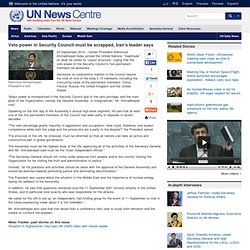
Decisions on substantive matters in the Council require the vote of nine of the body’s 15 members, including the concurring votes of the permanent members: China, France, Russia, the United Kingdom and the United States. UN veto power 'satanic tool' - JPost - Iranian Threat - News. Facing the threat of new UN sanctions, Iran's president said Monday the veto power held by the US and other permanent Security Council members is a "satanic tool.
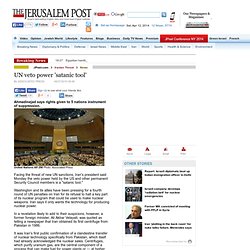
" Washington and its allies have been pressing for a fourth round of UN penalties on Iran for its refusal to halt a key part of its nuclear program that could be used to make nuclear weapons. Iran says it only wants the technology for producing nuclear power. In a revelation likely to add to their suspicions, however, a former foreign minister, Ali Akbar Velayati, was quoted as telling a newspaper that Iran obtained its first centrifuge from Pakistan in 1986. It was Iran's first public confirmation of a clandestine transfer of nuclear technology specifically from Pakistan, which itself had already acknowledged the nuclear sales.
Centrifuges, which purify uranium gas, are the central component of a process that can make fuel for power plants or — at higher levels of processing — weapons. U.S. Uses UN Veto Power More Than Others. See Also: 30 Years Of U.S.
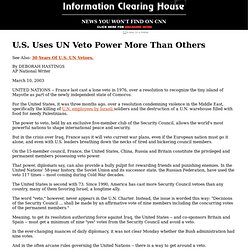
UN Vetoes. By DEBORAH HASTINGS AP National Writer March 10, 2003 UNITED NATIONS -- France last cast a lone veto in 1976, over a resolution to recognize the tiny island of Mayotte as part of the newly independent state of Comoros. For the United States, it was three months ago, over a resolution condemning violence in the Middle East, specifically the killing of U.N. employees by Israeli soldiers and the destruction of a U.N. warehouse filled with food for needy Palestinians. The power to veto, held by an exclusive five-member club of the Security Council, allows the world's most powerful nations to shape international peace and security. But in the crisis over Iraq, France says it will veto current war plans, even if the European nation must go it alone, and even with U.S. leaders breathing down the necks of tired and bickering council members.
That power, diplomats say, can also provide a bully pulpit for rewarding friends and punishing enemies. United Nations Security Council. The United Nations Security Council (UNSC) is one of the six principal organs of the United Nations (UN),[1] charged with the maintenance of international peace and security[2] as well as accepting new members to the United Nations[3] and approving any changes to its United Nations Charter.[4] Its powers include the establishment of peacekeeping operations, the establishment of international sanctions, and the authorization of military action through Security Council resolutions; it is the only UN body with the authority to issue binding resolutions to member states.
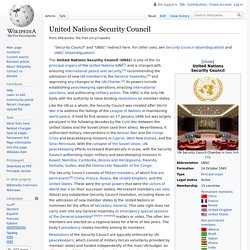
The Security Council held its first session on 17 January 1946. Like the UN as a whole, the Security Council was created following World War II to address the failings of a previous international organization, the League of Nations, in maintaining world peace. History[edit] Background and creation[edit] United Nations Security Council veto power. The United Nations Security Council "power of veto" refers to the veto power wielded solely by the five permanent members of the United Nations Security Council (China, France, Russia, United Kingdom, and United States), enabling them to prevent the adoption of any "substantive" draft Council resolution, regardless of the level of international support for the draft.
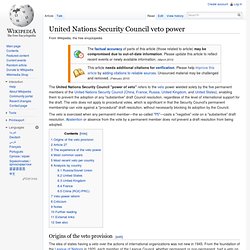
The veto does not apply to procedural votes, which is significant in that the Security Council's permanent membership can vote against a "procedural" draft resolution, without necessarily blocking its adoption by the Council. The veto is exercised when any permanent member—the so-called "P5"—casts a "negative" vote on a "substantive" draft resolution. Abstention or absence from the vote by a permanent member does not prevent a draft resolution from being adopted.